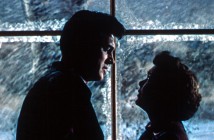
Editor’s Notes: Danny Collins and Valerie and Her Week of Wonders are out on their respective formats June 30th.
Danny Collins

Danny Collins (Universal) stars Al Pacino as the aging 1970s rock star of the title. A performer in the style of James Taylor or Neil Diamond, Danny has sold out. Though he’s had a very successful career, he’s managed to assemble a series of trophy wives, turn to alcohol and drugs, and bask in hedonism while continuing to fill stadiums with fans eager to experience his greatest-hits show. Danny’s personal life is at a critical crossroad. He is trying to get to know his son (Bobby Cannavale) better and he’s seriously interested in an age-appropriate woman (Annette Bening). Danny’s agent (Christopher Plummer) devotes his time and effort sparring with Danny over the singer’s lifestyle choices, but his words fall on deaf ears.
The catalyst that serves to move Danny to change the direction of his life is a letter written to him 40 years ago by John Lennon. Recently discovered, the letter urges a young Danny not to squander his talent in favor of material gain. This plot point is based on a true incident. In 1971, English folk singer Steve Tilston received a letter from Lennon advising him not to worry about accumulating weralth because it wouldn’t change the important things in life. Lennon signed the letter just months after The Beatles split up in December, 1970. Tilston didn’t receive the letter until 2005, when he was contacted by a collector.
Pacino turns in a first-rate performance — one of his best in recent years. His star power translates perfectly to that of the fictional music pop star. Both actor and character made it big in the 1970s, which adds an air of authenticity. Director Dan Fogelman has elicited excellent performances from the cast, though the viewer often knows what’s going to happen well before it’s shown. Watching Danny’s journey from complacency to self-awareness, however, allows Pacino to tap a wide range of emotions and paint a vivid portrait of a man trying to assess what is truly meaningful.
Extras on the Blu-ray/DVD Combo Pack include a behind-the-scenes making-of features and a gallery of Danny Collins album covers through the years. There is also a digital HD copy.
Valerie and Her Week of Wonders
 Valerie and Her Week of Wonders (The Criterion Collection) is an unusual film about a girl on the verge of womanhood who finds herself confronted by both supernatural creatures and her own burgeoning sensuality. Valerie (Jaroslava Schallerova) lives in a large house with her grandmother. She frolics in the fields, picks wildflowers, swims, and dutifully attends church. Her idyllic world is upset, however, when a thief steals a pair of earrings. Chasing the intruder, Valerie comes upon a horrible, white-faced ghoul inspired by Murnau’s Nosferatu. The next day, her jewelry is mysteriously returned, but Valerie soon becomes the centerpiece in a series of fantasies, one stranger than the next, many erotic.
Valerie and Her Week of Wonders (The Criterion Collection) is an unusual film about a girl on the verge of womanhood who finds herself confronted by both supernatural creatures and her own burgeoning sensuality. Valerie (Jaroslava Schallerova) lives in a large house with her grandmother. She frolics in the fields, picks wildflowers, swims, and dutifully attends church. Her idyllic world is upset, however, when a thief steals a pair of earrings. Chasing the intruder, Valerie comes upon a horrible, white-faced ghoul inspired by Murnau’s Nosferatu. The next day, her jewelry is mysteriously returned, but Valerie soon becomes the centerpiece in a series of fantasies, one stranger than the next, many erotic.It’s tough to categorize this film. The presence of vampires and witchcraft make it a candidate as a horror film, but it’s far more. Czech director Jaromil Jires uses surrealism to paint assorted dream adventures and takes his time introducing the fantasy elements. We first see Valerie as a content innocent, but soon she becomes a restless individual fascinated by erotic thoughts and images as she comes to terms with her own sexuality. Jires is masterful at portraying Valerie’s inner turmoil cinematically, each shot methodically composed.
The film is seldom mentioned in discussions of horror films, since it is atypical of the genre. It contains aspects that we identify with horror, but they are treated more as devices to awaken erotic stirrings in a young woman than to shock or splatter the screen with blood. It’s a gothic fable filled with fairy tale symbolism, often unsettling images, and an intriguing narrative ambiguity. The film is in Czech, with English subtitles.
Bonus features on the Blu-ray release include 3 early shorts by director Jaromil Jires; new interview with Czechoslovak film scholar Peter Hames; interviews with actors Jaroslav Schallerova and Jan Klusak; alternate soundtrack; new English subtitle translation; and a critical essay.



